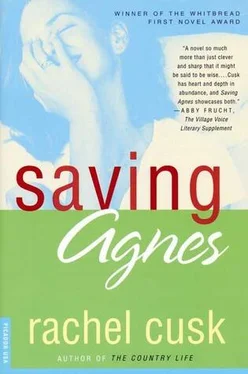Her early ejection from the masculine world was remembered not as a gradual drifting away on a soft cloud of burgeoning femininity, but rather as a hideous eruption of deformities accompanied by a simultaneous rejection from the society of her brother Tom and his friends. If in the latter case this shunning had been precipitated by hazy boyish visions of Agnes, laden with sanitary towels, slowing down their cycling trips and becoming a cumbersome camper, Agnes was never told of it. Early manifestations of more tangible changes, however, had been volubly noted and were still uncomfortably memorable. Once, while at the swimming pool, Agnes had executed a graceful dive and had emerged to see Tom’s face contorted not with congratulation but disgust.
‘Yuk!’ he cried. ‘You’ve got hair underneath your arms!’
Much of what followed proceeded along similar lines, with subsequent developments being acknowledged only when they were found to be repulsive.
‘Time we bought you some deodorant,’ her mother would say, sniffing the air as Agnes embraced her on her return home from school.
‘Can’t you get her a bra?’ her father would inquire as Agnes lunged, T-shirted, over a tennis court.
Agnes, who had long since started patrolling her body for acts of hormonal terrorism, had already requested funding for security devices and had been turned down on the grounds that she had not yet officially reached puberty. Knowing from those heavyweights at school who had graduated early from childhood that legitimacy could be attained at the cost of a little bloodshed, Agnes finally committed the felony of false menstruation; a transgression which, while considerably taxing her imagination, allowed her to jump the queue undetected without any of the disadvantages she had heard about in corridors and common-rooms. Her deception, however, carried with it its own punishment. As time wore on, fact did not appear to be catching up with fiction. For two years Agnes existed in a torment of guilt and anxiety. She toiled beneath the burden of a double conceit as she tried to find ways of disposing of the stockpile of monstrous surgical swabs which her mother, regular as clockwork, placed in discreet paper bags in her room. She grew confused by the hybrid growth of both the lie and the abnormality it concealed, and on one occasion even indulged her fantasy so far as to ask her mother is she might change to Tampax. Her justification may have been honest — they were, she reasoned, easier to get rid of — but it gained her little moral or material ground. Indeed, it seemed even to retard her cause, for her mother had become shocked and flustered at the suggestion and had begun to babble in the most distressing manner about penetration, which led to a long discussion concerning intimate details of what she and Daddy did together when they were on their own. Already fully informed and disgusted on this score, Agnes found her situation becoming more complex as she was expected to feign innocence on top of the worldliness she had long been forced to pretend.
Her joy, then, when at the age of fifteen the indubitable proof of her femininity finally arrived, was intensely private and tinged with remorse. Even when daubing and stemming with the best of them, Agnes felt that she had not done it properly. The redness of her own blood, official though it was, could not begin to compensate for all she had suffered.
As she grew older Agnes realised, somewhat to her dismay, that really she had little to complain about with respect to her childhood. While her parents had claimed from the start that this was the case, their concomitant conviction that Agnes’s adolescent dissatisfactions were nothing but the offspring of her melodramatic and rather lachrymose disposition was less justifiably held. The pain Agnes had felt within the tastefully papered walls of her family home was, she now knew, partly the product of her ignorance of the injustices of which the larger world outside them was capable. Nina, for example, had been brought up in a mock-Tudor villa in East Sheen, where all her friends called her mother ‘Margo’. But the subtler dramas of country living, with its cruel provincial ways, its sniping observations and censorious unwritten laws which bound young aspiring souls like the feet of Japanese women, could, Agnes later found, compete with the most scarred of childhoods. At university she was surprised to discover that a background such as her own was almost de rigueur : the régimes of the middle classes, she learned, ranked side by side with those of small Central American countries in terms of the abuses they perpetrated. But bashing the bourgeoisie required a certain distance from them; and having always judged herself fortunate in possessing two kind parents, she was understandably reluctant, not to mention afraid, to orphan herself so precipitantly. As time wore on she was glad of her reticence, for during the ensuing three years most of those who had so scornfully kicked over the traces of their past were driven either by penury or maturity to uncover them again. By then, even Nina herself was calling her mother Margo.
It was only later that Agnes came to suspect she might have deprived herself of a necessary kind of exorcism by declining to follow her peers through this rite of passage. Hers was a life of small hurts, she realised, rather than gross abuses; but nevertheless it began to disturb her that, even thus embarked as she now was upon her adult life, she could still be ambushed by pain at things which should have been long forgotten. Incidents from her youth would sometimes surface unbidden in her mind like creatures from a murky swamp, and she would relive them with a freshness unsullied by the passing of time.
‘You’re off-loading childhood guilt,’ said Merlin comfortingly. He had grown up in a women’s commune in Hampstead and had an easy grasp of this sort of vocabulary, presumably the residue of a childhood which had not required off-loading. ‘It’s perfectly natural.’
Agnes, worked up by his kindness into a spirit of confession, told him about a time when, at the age of about twelve, she had persuaded her brother Tom to stage his own death beneath one of the highest windows of their house. She had covered him in tomato ketchup and left him lying in a flowerbed while she ran to get her mother, who had, for some reason which eluded her at the time, become completely hysterical and, having elicited a confession from the treacherous Tom, had chased Agnes around the house with an egg-flipper. Merlin’s expression was one of uncertainty.
‘That is weird,’ he said. Seeing the devastation on Agnes’s face, he added: ‘The bit about the egg-flipper, I mean.’
John had loved that story, Agnes remembered. She had told him a lot of things she would never tell anyone else, things that lurked in the pit of her mind smothered in a furry mould of guilt. He had hoarded these rancid pieces of her past and would occasionally bring them out and gleefully examine them.
‘What did you think she would do?’ he had asked, eyes glinting with an enjoyment which bordered on malevolence. ‘Your mother, I mean. What did you think her reaction would be?’
Agnes thought about it for a while. She saw her brother’s small body curled up amongst the hydrangeas, the ketchup lurid in the sun.
‘I thought she would think it was funny,’ she said.
AGNES and he met religiously twice a week, although Agnes was beginning to experience heretical feelings of frustration at the formality of their arrangement. The unerring symmetry of Wednesday and Saturday oppressed her like a dentist’s appointment, and was equally as far from the passionate spontaneity she longed for. He would drive her home with a kind of reined-in intensity, his face set, his beautiful hands veined and strangely articulate on the steering wheel; but if at first she had thought this exercise to be a prelude to other transports of delight, she soon learned not to expect them. Sometimes he would come in, locking the car and following her to her room wordless as a shadow. Other times he would keep the engine running, looking at her like a taxi driver awaiting his fare while she talked too much and too loud to cover her embarrassment. At these times she often wondered if she should be doing something — if there was something everyone else did at times like these to force the moment to a resolution — but he was silent and left her no clues. Sometimes she felt as if they were both wrapped in cellophane, their mouths formless as melted wax.
Читать дальше












